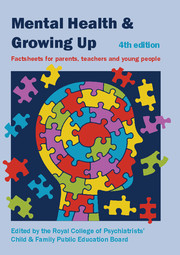Book contents
- Frontmatter
- Contents
- Contributors
- Factsheets for young people
- 1 Bipolar disorder
- 2 Cannabis and mental health
- 3 Cognitive–behavioural therapy (CBT)
- 4 Coping with stress
- 5 Depression
- 6 Drugs and alcohol
- 7 Exercise and mental health
- 8 Mental illness in a parent
- 9 Obsessive–compulsive disorder (OCD)
- 10 Psychosis
- 11 Schizophrenia
- 12 When bad things happen – overcoming adversity and developing resilience
- 13 Worries about weight and eating problems
- 14 Worries and anxieties
- 15 Who's who in child and adolescent mental health services (CAMHS)
- Factsheets for parents, carers and anyone who works with young people
12 - When bad things happen – overcoming adversity and developing resilience
from Factsheets for young people
Published online by Cambridge University Press: 02 January 2018
- Frontmatter
- Contents
- Contributors
- Factsheets for young people
- 1 Bipolar disorder
- 2 Cannabis and mental health
- 3 Cognitive–behavioural therapy (CBT)
- 4 Coping with stress
- 5 Depression
- 6 Drugs and alcohol
- 7 Exercise and mental health
- 8 Mental illness in a parent
- 9 Obsessive–compulsive disorder (OCD)
- 10 Psychosis
- 11 Schizophrenia
- 12 When bad things happen – overcoming adversity and developing resilience
- 13 Worries about weight and eating problems
- 14 Worries and anxieties
- 15 Who's who in child and adolescent mental health services (CAMHS)
- Factsheets for parents, carers and anyone who works with young people
Summary
What does it mean to have resilience?
Bad things happen to everyone. These experiences may be very difficult, yet some children show a remarkable ability to manage and cope. We call these children ‘resilient’. Some children can be more resilient than others which may explain why children within the same family may react differently to a traumatic event, such as a death in the family. This leaflet is about building resilience and finding ways to cope better with difficult situations.
When bad things happen, you may feel sad and worried, angry and stressed. Life can become tough sometimes, so learning how to cope is an important skill we need to have. If life was always perfect then we would never develop coping skills or learn what makes us feel better. So dealing with difficulties can help us learn how to cope with problems when they crop up, as we know what works for us.
Having a friend to talk to, having an interest which distracts us from our worries, chilling out by listening to music or surfing the net can all be ways of coping.
What do you do when things are tough?
There are some things specific to you that will affect how you manage situations such as those described in the box on the right. These are not things you can change, but they may explain why you might find your situation more difficult than your brother or sister does. For example, you may have an illness yourself, such as asthma or diabetes, which is an added stress; or you may tend to be a ‘worrier’ rather than someone who is more ‘easy going’. Neither is better overall, but being more of a worrier may mean you feel more affected by things that happen in your life.
How can I make things easier for myself?
Things that make life difficult are often completely out of your control. But there are things you can do to make them have less of an effect on you. This doesn't mean managing things on your own, but asking for help, sometimes even outside your family. You could start by confiding in someone you trust. If that doesn't work, you could try other things.
- Type
- Chapter
- Information
- Mental Health and Growing UpFactsheets for Parents, Teachers and Young People, pp. 35 - 37Publisher: Royal College of PsychiatristsPrint publication year: 2013



